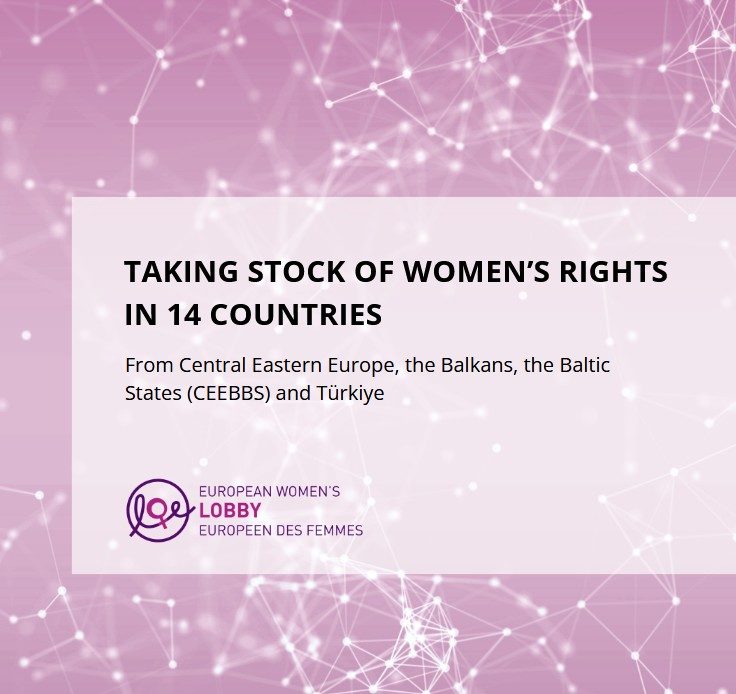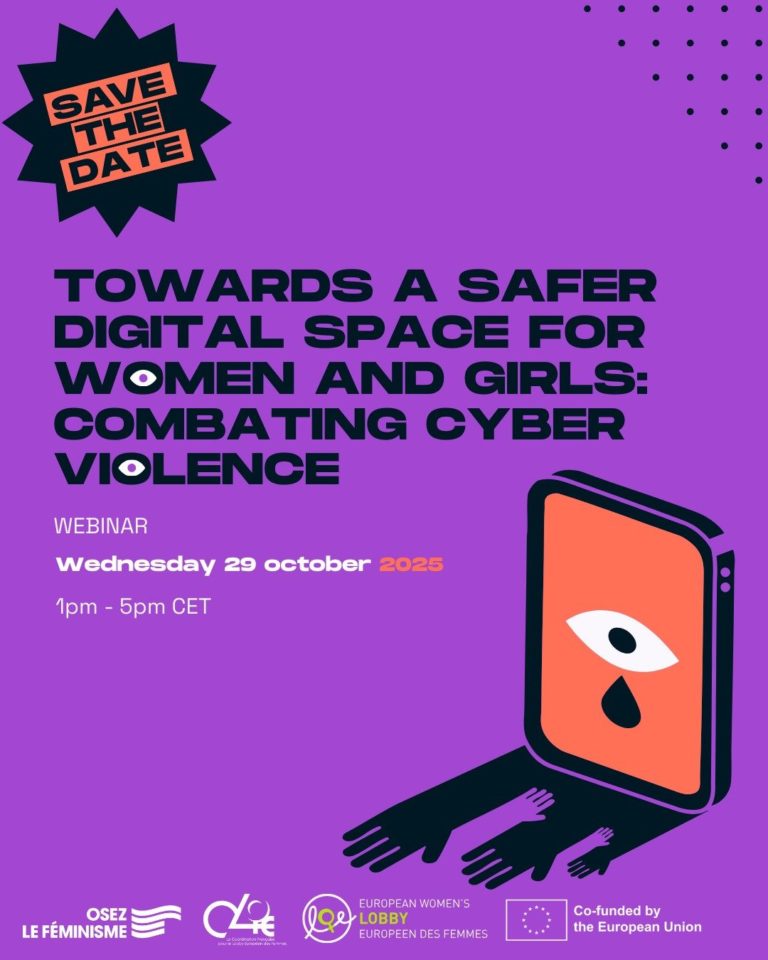[Brussels, 15 January 2019]
The sixty-third session of the global Commission on the Status of Women (CSW) will take place at the United Nations Headquarters in New York from 11 to 22 March 2019. Representatives of Member States, UN entities, and ECOSOC-accredited non-governmental organisations (NGOs) from all regions of the world are expected to attend the session. We will be there too! Read our statement here.
Social protection systems, access to social services and sustainable infrastructures are our collective mechanisms of solidarity, based on the premise that every woman, man, girl and boy has the right to enjoy an equal life in dignity and free of violence. Social protection is a human right recognised by several international legal instruments, including the Universal Declaration of Human Rights, the Beijing Declaration and Platform for Action and the Convention on the Elimination of All Forms of Discrimination against Women. Social protection plays a vital role both in preventing women’s poverty and in lifting women out of poverty. Social protection systems must be protected, expanded and provide sufficient means to fulfil their role as a mechanism of income distribution and provision of social services.
The Beijing Declaration and Platform for Action places the obligation on Governments to “create social security systems wherever they do not exist, or review them with a view to placing individual women and men on an equal footing, at every stage of their lives”. Nonetheless, economic insecurity and austerity driven policies of the last decade have eroded social rights and aggravated existing inequalities in the enjoyment of social protection, access to public services and infrastructures, all of which disproportionately is affecting women.
Social protection systems, access to social services and sustainable infrastructures are also crucial to achieve the 2030 Agenda for Sustainable Development (SDGs). Governments have committed to “implement nationally appropriate social protection systems for all, including floors” for reducing and preventing poverty (SDG 1.3). This commitment to universal protection for all is reaffirmed in the ILO Social Protection Floors Recommendation No. 202.
For the past decade, reduction in public spending has led to the erosion of investments in public services, which has had a major impact on women. In many countries, the public sector has been the driver for gender equality in employment. Public sector jobs provide better employment opportunities, better working conditions and pay, and provide conditions towards an enabling environment for both women and men to share paid and unpaid work: paid leave, care and other work-life balance options as outlined in the Agreed Conclusions of the 61st session of the Commission on the Status of Women. Cuts in public sector jobs directly affect women since women represent the vast majority of public sector workers. Cuts in this sector are a major threat to gender equality both in employment, and in the provision of publicly funded social services, which women rely on more than men.
Austerity has been disastrous for women; in many respects and particularly in their access to quality, affordable social services and sustainable infrastructures. It has resulted in cuts and curtailed services to end violence against women (VAW) and support for the victims of violence, including shelters and rape crisis services. Cuts in these services are a false economy, a serious threat to women’s human rights, and a very high price for society to pay in the short, medium and long term as violence against women increase.
Cutbacks in public services imposed by austerity have a double impact on women: on the one hand, women’s economic independence is compromised and their poverty heightened. On the other hand, women are forced to cushion the impact of cutbacks in public services as the services are transferred back to the households. This, coupled with the reduction of work-life balance measures, threatens progress achieved to date, resulting in a rolling back of women’s participation in all areas of life and a return to traditional gender roles.
The disadvantages faced by women in the labor market translate, in turn, into a wide gender pension gap, which means poverty for many women in the later stages of their lives. Pensions are a crucial mechanism of intergenerational solidarity inherent to social protection and a key factor in SDG 1.3. However, benefit levels are often inadequate to tackle old age poverty, particularly for women. The pension income of women is negatively influenced by the outdated, male bread-winner model. The accumulation of gender inequalities over the life span; the gender pay gap; time spent out of the labor market to care for children and other dependent family members; and women’s overrepresentation in part-time work and in low paid sectors of the economy, results in excessive gender income gaps in old age. In the EU, the average gender pension gap is 40%.
Therefore, we urge governments, in particular with regards to ongoing pension and taxation reforms, to close the gender pension gap and revise the outdated male breadwinner model in tax and social protection policies. Pension schemes should be designed to reduce economic inequalities between women and men and to ensure that both women and men can become equal earners and equal carers throughout their lives. We call for a universal adequate basic old age pension to provide a dignified standard of living for everybody, paying particular attention to the life-long earnings gap between women and men.
We urge governments to invest in social infrastructures and social services. Support women of all ages, from pregnancy, through motherhood and back to work through public services and social protection systems. Good quality and accessible obstetrics should be available for all mothers, regardless of their social status and economic conditions.
We call for individual, non-transferable paid parental leave. This would increase men’s take up of leave, and create the conditions to ensure that reconciliation of work, private and family life is a shared responsibility and not solely on the shoulders of women. Work-life balance policies should go hand in hand with the provision of publicly financed, good quality and accessible childcare and other care services throughout the life-cycle.
We call on governments to effectively implement gender equality mainstreaming as a means to transform societies for the benefit of all. This includes applying a gender equality perspective in the preparation, design, implementation, monitoring and evaluation of all policies, including social protection, social services and sustainable infrastructures.
We urge governments and donors, as part of gender equality mainstreaming, to apply gender equality budgeting to ensure that revenue generated through collective taxation is allocated and public and donor money is spent in a way that will reduce gender inequalities and reduce women’s unpaid work. It is also crucial that women have a say in how public money is spent, and that specific resources are allocated to tackle gender inequalities, in social protection, access to social services and in sustainable infrastructures.
In implementing gender equality mainstreaming, it is vital that governments work in cooperation with civil society, specifically with women’s and girls-led organisations, women human rights defenders and feminist groups. Only by effectively engaging civil society in this process, it will be possible to include women and girl’s needs and interests in the political agenda at the local, national and international level.
We urge UN Member States to:
- Prevent profit-driven privatisation of public services and guarantee access to these services for all;
- Create the conditions in which women and men can become equal earners and equal carers throughout their lives by reshaping the outdated male breadwinner model that continues to define social protection systems in many countries to the detriment of women’s equal access thereto;
- Uphold women’s human rights by ensuring that there are no cutbacks to services designed to end male violence against women (VAW) and support the victims of violence;
- Implement public infrastructure to prevent, protect and provide exist options for victims of male violence of the sex industry.
- Introduce individual and non-transferable paid parental leave, to ensure a more equal sharing of care responsibilities in partnerships and families;
- Invest in and develop high quality, accessible and affordable care services across the life-cycle;
- Validate skills acquired in informal settings, to facilitate women’s return to the labour market;
- Ensure a guaranteed income for all, throughout the life cycle;
- Ensure that pension reforms do not increase gender inequality – gender pension gap, recognizing women’s different working life patterns;
- Establish a universal adequate basic old age pension, which is not means tested;
- Abolish tax and social security exemptions, especially in the low pay sector, such policies prevent contributing to social protection systems in the short term but have adverse impact in the long term, for example on pensions ;
- Promote the implementation of gender equality mainstreaming and gender equality budgeting in the preparation, design, implementation, monitoring and evaluation of all policies with the objective of achieving an ecological, social and gender sustainable economy;
The European Women’s Lobby
Attached documents



